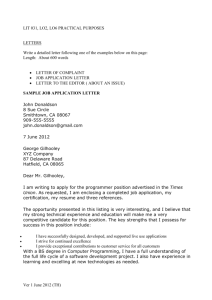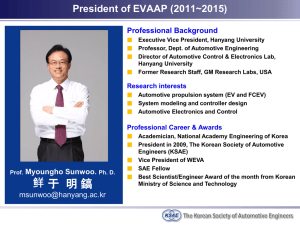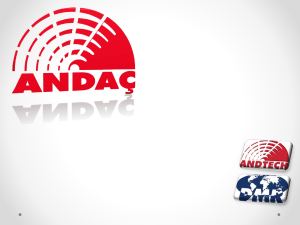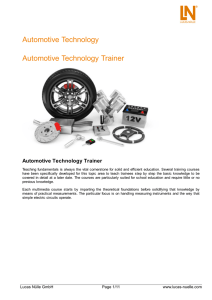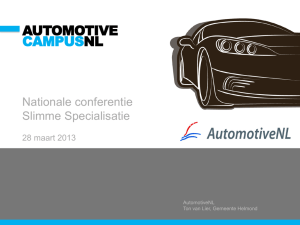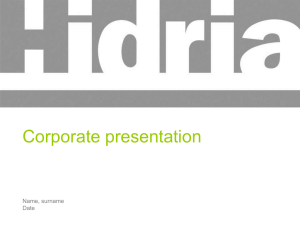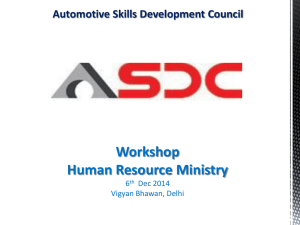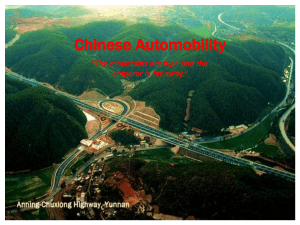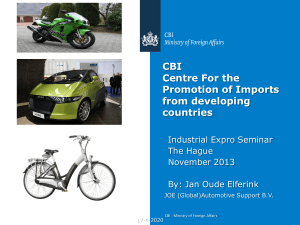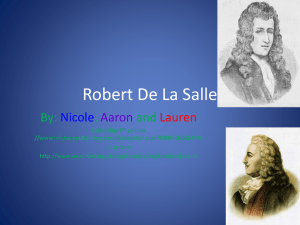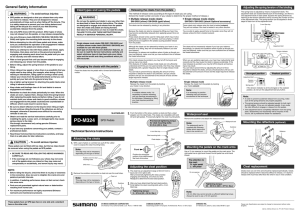Manufacturing Process Center
advertisement
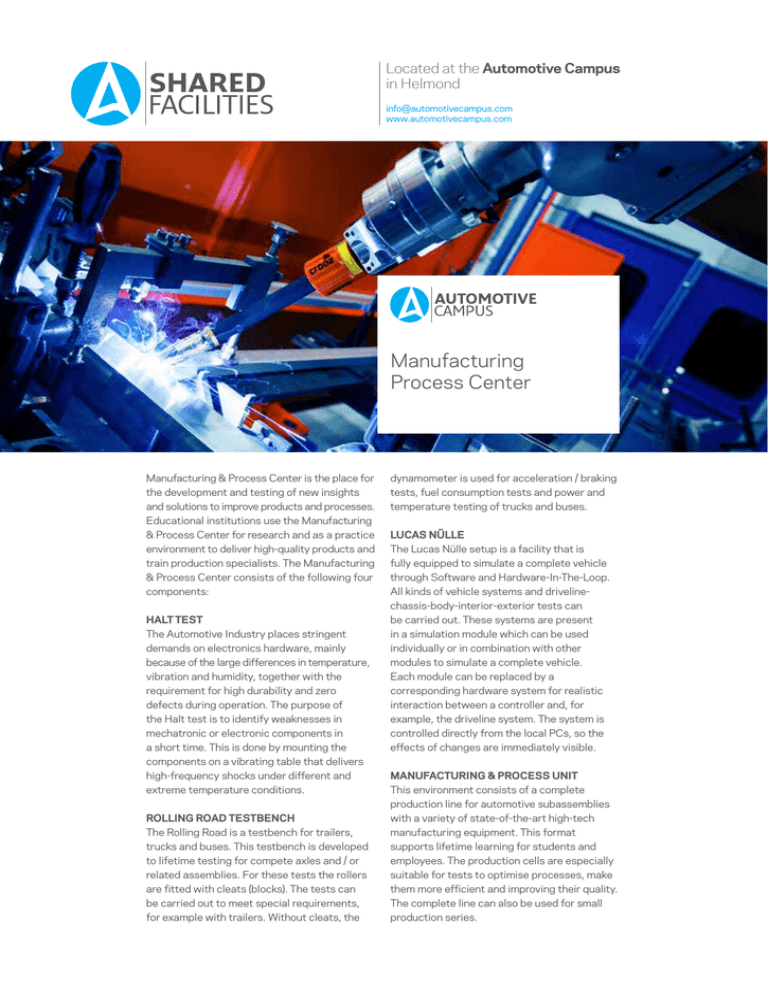
Located at the Automotive Campus in Helmond info@automotivecampus.com www.automotivecampus.com Manufacturing Process Center Manufacturing & Process Center is the place for the development and testing of new insights and solutions to improve products and processes. Educational institutions use the Manufacturing & Process Center for research and as a practice environment to deliver high-quality products and train production specialists. The Manufacturing & Process Center consists of the following four components: Halt test The Automotive Industry places stringent demands on electronics hardware, mainly because of the large differences in ­temperature, vibration and humidity, together with the ­requirement for high durability and zero ­defects during operation. The purpose of the Halt test is to identify weaknesses in ­mechatronic or electronic components in a short time. This is done by mounting the components on a vibrating table that delivers high-frequency shocks under different and extreme temperature conditions. Rolling Road testbench The Rolling Road is a testbench for trailers, trucks and buses. This testbench is developed to lifetime testing for compete axles and / or related assemblies. For these tests the rollers are fitted with cleats (blocks). The tests can be carried out to meet special requirements, for example with trailers. Without cleats, the dynamometer is used for acceleration / braking tests, fuel consumption tests and power and temperature testing of trucks and buses. Lucas Nülle The Lucas Nülle setup is a facility that is fully equipped to simulate a complete vehicle through Software and Hardware-In-The-Loop. All kinds of vehicle systems and driveline-­ chassis-body-interior-exterior tests can be carried out. These systems are present in a ­simulation module which can be used ­individually or in combination with other ­modules to simulate a complete vehicle. Each module can be replaced by a ­corresponding hardware system for ­realistic interaction between a controller and, for example, the driveline system. The system is controlled directly from the local PCs, so the effects of changes are immediately visible. Manufacturing & Process Unit This environment consists of a complete ­production line for automotive ­subassemblies with a variety of state-of-the-art high-tech ­manufacturing equipment. This format supports lifetime learning for students and employees. The production cells are especially suitable for tests to optimise processes, make them more efficient and improving their quality. The complete line can also be used for small production series. It enables companies and knowledge institutes to simulate complete production processes, programming of robot cells and experiments with welding, bonding, sawing and drilling processes. All cells are equipped with an EDC system linked in an MES application. Two stations with the latest Siemens Technomatix software are installed to simulate production processes, robots ergonomics etc. Specifications of the 4 facilities: Halt test • VTC-9 Environmental HALT chamber, Metric 400VAC 50Hz • TARIC code; 90278097 Country of Origin; USA • Temperature Range: -100/+200 °C • Change rate: 70°Cw/min • Vibration Table Dimensions: 914X914mm • Table Bolt Pattern: M10 on 100mm • Frequency Range: dc~10.000 Hz in Random • Vibration Max. Level: 100 Grms • Internal Dimensions: 1067X1067X965(WXDXH)mm • Doors 2 bi-parting opening both front & back. Door locking system • Windows:4, 279X584mm in each door Rolling Road test • This bench has two separately driven rollers. • Roller diameter 3 m. • Two tracks of the rollers can be fitted with cleats for time trial testing of (mainly) trailer axles and suspension systems. The cleats are designed so that an entire frequency spectrum of a paved road can be simulated. During the test the vehicle changes frequently between the two cleat tracks. Jean Pierre Heijster Programme Manager Manufacturing & Ecosystem T +31 (0) 492 56 2538 C +31 (0) 6224 719 86 E j.p.heijster@AutomotiveNL.com www.AutomotiveNL.com • • • Peripheral speeds: 40 to 60 km e ­ ndurance testing with cleats, up to 100 km without cleats Maximum axle load: 13 tonnes Electric motor power: 2 x 245 kW, 15500 Nm Lucas Nülle Lucas Nülle provides complete training concepts and solutions for ­electrical/­­electric ­engineering, automation technology, ­mechatronics, ­communications, drives and automotive ­technology. UniTrain-I Lab Soft Classroom Manager Installation Engineering Manufacturing & Process Unit • CLOOS Welding Robot Cell C30 • CLOOS QiroxR QRC 410 suspended Robot • CLOOS Qineo Pulse 450 welding machine • The system is equipped with two ­rotary ­manipulators which are included in a r­ otatable H-frame. Range of the ­workstations are 3000x1600mm ­Maximum load is 1000Kg • Tigerstop ACK 420 B63D125 automated sawing-drilling machine • Bonding robot cell FANUC R-2000iA 165F with R-J3iB controller • Wiltec pressure controlled pump dosing system • Siemens Tenomatix 2.0 Acedamic software • Act-in RTI software suite The Netherlands has a thriving automotive industry with strong growth potential in the (inter-)national automotive world and the ability to make a significant contribution to solving societal issues in sustainability and mobility. To achieve these goals AutomotiveNL acts as industry organisation that strongly links the individual players. AutomotiveNL carries out a number of initiating and supporting activities that are important for the entire automotive industry in the Netherlands – working to build a strong ecosystem, promoting ­innovation, ­developing the AutomotiveCampusNL, ­marketing and internationalisation.
